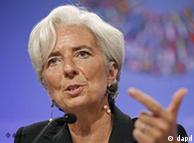IMF chief warns of 1930s-style depression
IMF head Christine Lagarde, speaking in Washington, said the world economic outlook is "quite gloomy" and warned that failure to act collectively could lead to a 1930s-style slump.

Christine Lagarde, head of the International Monetary Fund, didn't mince her words in at meeting on Thursday at the US State Department.
"The world economic outlook at the moment is not particularly rosy – it is quite gloomy," she said, warning that failure to act collectively could lead to protectionism and isolation reminiscent of the 1930s depression.
"There is no economy in the world, whether low-income countries, emerging markets, middle-income countries or super-advanced economies that will be immune to the crisis that we see not only unfolding but escalating," Lagarde cautioned.
"It is not a crisis that will be resolved by one group of countries taking action. It is going to be hopefully resolved by all countries, all regions, all categories of countries actually taking action."
Disciplined fiscal policy
But she was also quick to add that "clearly it's going to have to start from the core of the crisis at the moment, which is obviously the European countries and, in particular, the countries of the eurozone."
The 17-nation eurozone, Lagarde noted, was not "properly completed" after its establishment in 1999 because disciplined fiscal and monetary policies were not fully laid down and enforced.
At a summit in Brussels last week, eurozone leaders agreed to tough new standards for fiscal spending and borrowing in hopes of quelling market uncertainty that one or more of the group members could default on their debt and undermine the single-currency zone. They also agreed to lend up to 200 billion euros ($260 billion) to the IMF to help struggling eurozone states.
At a summit in Brussels last week, eurozone leaders agreed to tough new standards for fiscal spending and borrowing in hopes of quelling market uncertainty that one or more of the group members could default on their debt and undermine the single-currency zone. They also agreed to lend up to 200 billion euros ($260 billion) to the IMF to help struggling eurozone states.

As European leaders work to resolve their "monumental" challenges, the impatience of financial markets is a problem, Lagarde conceded. She cautioned that democratic processes often make quick fixes difficult, saying that the collision of market expectations with political reality must be resolved.
Lagarde's comments came as the credit rating firm Fitch downgraded the viability of several global banks, citing increased challenges to their business and the prospect of financial turmoil.
The IMF has warned that it is likely to cut its 2012 growth projections, as the economy struggles with a worsening two-year eurozone debt crisis and sluggish US growth. There are also signs from falling Chinese factory output that manufacturers are struggling with waning global demand and tighter credit conditions.
Author: John Blau (Reuters, AFP; AP)
Editor: Gabriel Borrud
No comments:
Post a Comment